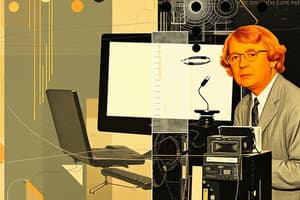Podcast
Questions and Answers
What is a primary challenge related to over-reliance on technology?
What is a primary challenge related to over-reliance on technology?
- Enhanced human interaction skills
- Improved training and skills development
- Decreased cost of technology implementation
- Hindered human interaction and problem-solving skills (correct)
Which of the following best defines Artificial Intelligence (AI)?
Which of the following best defines Artificial Intelligence (AI)?
- Computer systems that perform tasks requiring human intelligence (correct)
- A tool to enhance human creativity
- A method to connect multiple physical devices
- Software primarily for data storage
What does the term 'Digital Divide' refer to?
What does the term 'Digital Divide' refer to?
- Equal access to technology for all individuals
- The integration of artificial intelligence in daily life
- The gap between those who have access to technology and those who do not (correct)
- Advanced digital skills among all segments of society
What is one of the key ethical considerations in ICT?
What is one of the key ethical considerations in ICT?
What type of devices does the Internet of Things (IoT) primarily involve?
What type of devices does the Internet of Things (IoT) primarily involve?
What does ICT stand for?
What does ICT stand for?
Which of the following is considered hardware in ICT?
Which of the following is considered hardware in ICT?
What role does software play in ICT?
What role does software play in ICT?
Which application of ICT enhances communication between teachers and students?
Which application of ICT enhances communication between teachers and students?
Which of the following is NOT a benefit of ICT?
Which of the following is NOT a benefit of ICT?
What type of technology includes smartphones and tablets?
What type of technology includes smartphones and tablets?
Which application type is specifically utilized in healthcare?
Which application type is specifically utilized in healthcare?
What characteristic of ICT facilitates administrative processes in government?
What characteristic of ICT facilitates administrative processes in government?
Flashcards
ICT Definition
ICT Definition
Information and Communication Technology; encompassing all technologies used to collect, process, store, and exchange information.
ICT Hardware
ICT Hardware
Physical components like computers, printers, and smartphones in an ICT system.
ICT Software
ICT Software
Sets of instructions that tell hardware what to do; includes operating systems and programs.
ICT Networks
ICT Networks
Signup and view all the flashcards
ICT Communication Technologies
ICT Communication Technologies
Signup and view all the flashcards
ICT in Business
ICT in Business
Signup and view all the flashcards
ICT in Education
ICT in Education
Signup and view all the flashcards
ICT Benefits
ICT Benefits
Signup and view all the flashcards
Cloud Computing
Cloud Computing
Signup and view all the flashcards
Artificial Intelligence
Artificial Intelligence
Signup and view all the flashcards
Digital Divide
Digital Divide
Signup and view all the flashcards
Data Privacy
Data Privacy
Signup and view all the flashcards
Security Risks in ICT
Security Risks in ICT
Signup and view all the flashcards
Study Notes
Introduction to ICT
- ICT stands for Information and Communication Technology.
- It encompasses all technologies used to collect, process, store, and exchange information.
- This encompasses a vast range of tools and systems, including computers, software, networks, and mobile devices.
Key Components of ICT
- Hardware: Physical components like computers, printers, smartphones, and other peripherals.
- Software: Sets of instructions that tell the hardware what to do. This encompasses operating systems, applications, and programs.
- Data: Raw facts, figures, and information that can be processed.
- Networks: Systems that connect computers and devices, allowing for communication and resource sharing. Examples include the internet and local area networks (LANs).
- Communication Technologies: Tools for sending and receiving information, such as email, instant messaging, video conferencing, and other forms of telecommunications.
Applications of ICT
- Business: Used for tasks like accounting, customer relationship management (CRM), supply chain management, e-commerce, and communication with clients.
- Education: Supports online learning, interactive lessons, assessments, and communication between teachers and students.
- Healthcare: Utilized for electronic health records (EHRs), patient monitoring, telemedicine, and medical research.
- Government: Enables efficient delivery of public services, enhances communication with citizens, and facilitates administrative processes.
- Personal Use: Used for entertainment, communication, information access, and personal productivity tools like word processors and spreadsheets.
Benefits of ICT
- Increased Efficiency: Automating tasks and streamlining processes leads to faster and more effective work.
- Improved Communication: Fosters better collaboration and communication across geographical boundaries.
- Enhanced Productivity: Tools like productivity software and automated tasks can improve output and reduce errors.
- Accessibility to Information: Enables quick access to vast amounts of information from around the world.
- Cost Savings: Can reduce operational costs by automating tasks and minimizing travel.
Types of ICT
- Mobile Technology: Smartphones, tablets, and wearable devices enable communication and access to information on the go.
- Social Media Platforms: Online platforms allowing interaction and communication between users.
- Cloud Computing: Storing and accessing data and software over the internet instead of on a physical device.
- Artificial Intelligence (AI): Computer systems that can perform tasks that typically require human intelligence, such as learning, problem-solving, and decision-making.
- Internet of Things (IoT): Network of interconnected physical devices that can communicate and exchange data.
Challenges of ICT
- Security Risks: Threats like hacking, malware, and data breaches must be addressed.
- Digital Divide: Unequal access to technology and digital literacy creates a divide between different segments of society.
- Privacy Concerns: Individuals must be aware of the privacy implications of data collection and use.
- Dependence on Technology: Over-reliance on technology may hinder human interaction and problem-solving skills.
- Maintaining Ethical Use: Ensuring that technology is applied in a responsible and ethical manner, avoiding misuse, is crucial.
- Cost of Implementation and Maintenance: Setting up and maintaining ICT systems can be expensive.
- Training and Skills Development: Users need sufficient training to effectively use and integrate ICT technology.
- Data Overload: The abundance of information can be overwhelming and require effective methods for organization and retrieval.
Ethical Considerations in ICT
- Data Privacy: Protecting personal information and ensuring responsible data collection and usage is paramount.
- Intellectual Property Rights: Safeguarding original creations and inventions.
- Digital Citizenship: Encouraging respectful and responsible online behavior and participation.
- Bias and Discrimination: Recognizing potential biases in algorithms and data, and ensuring fair and unbiased systems.
Studying That Suits You
Use AI to generate personalized quizzes and flashcards to suit your learning preferences.




